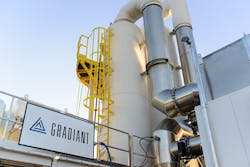Gradiant opens R&D center; Emerson partners with Texas A&M; Aqua Terra & De Nora offer produced water recycling
Gradiant Corporation opens Asia-Pacific headquarters and new R&D center for water technology in Singapore
Gradiant Corporation opened a new research and development (R&D) center in Singapore that will also serve as the company’s Asia-Pacific headquarters. The Asia-Pacific headquarters, supported by the Singapore Economic Development Board, will allow Gradiant to expedite the development of solutions for industrial desalination, brine minimization and water reuse. Gradiant’s facility in Singapore will initially employ 10 senior water scientists and engineers, many of whom were trained at MIT, with plans to double the size of the team by year-end. Gradiant’s CTO and co-founder Prakash Govindan will lead the Singapore-based team.
"By expanding operations to Singapore, our R&D Center of Excellence will be located on the front lines of the water innovation sector," said Govindan. "This expansion will enable Gradiant to build a strong research and business presence in Singapore as we continue to provide innovative, industry-leading solutions for water reuse, desalination and zero liquid discharge applications across the Asia-Pacific region and around the world."
Gradiant’s North American operations include its largest subsidiary, Gradiant Energy Services, an oilfield services business focused on unconventional oil and gas with over 100 employees.
Emerson partners with Texas A&M College of Engineering to build advanced automation laboratory
Emerson and Texas A&M established the Emerson Advanced Automation Laboratory funded by the company’s $1.5 million donation. The laboratory will provide Texas A&M engineering students a modern, high-tech and active learning environment that simulates real-world plant operations in manufacturing facilities for the oil and gas, refining, life sciences, food and beverage, and other industries. The laboratory will be a part of the university’s new Zachry Engineering Education Complex, a 525,000-square foot state-of-the-art facility scheduled to open later in 2018. In addition to the new advanced automation laboratory, Emerson will provide the process control equipment for a functional distillation column to facilitate hands-on teaching. Students and faculty can meet to study and problem-solve in the new Emerson collaboration room. Emerson will also work with the College of Engineering to integrate and expand its industrial wireless technologies throughout the Zachry Engineering Education Complex.
Aqua Terra Water Management and De Nora to offer produced water recycling in the Permian Basin
Aqua Terra Water Management — a provider of oilfield water disposal and oilfield waste management — and De Nora — a designer of safe, innovative and sustainable water disinfection and oxidation, filtration and electrochlorination solutions — have partnered to provide economic solutions for the transportation, disposal and recycling of produced water. De Nora’s approach to recycling leverages existing capital infrastructure investments made by operators to enable recycling that removes virtually all TSS and iron and eliminates all biological activity for over 90 days. This results in a perfect brine for fracking purposes, as the iron feed stock for the bacteria that generate hydrogen sulfide is removed, and 100 percent of these bacteria are eliminated during the process.
Recent recycling conducted by De Nora and Aqua Terra Water Management using De Nora’s process at Aqua Terra’s Jaker facility resulted in 98 percent reduction of iron, 100 percent bacteria kill and an 80+ percent reduction in TSS, producing quality fracturing fluid at rates exceeding 30,000 barrels per day.
"Working together with Aqua Terra provides a sound solution for mass recycling in some of the most water-challenged areas in the USA – including the Permian Basin, which is currently undergoing a significant drought," said Bryan Brownlie, managing director at De Nora Water Technologies, Texas, LLC. "Recycling reduces the drawdown of fresh water and significantly lessens the impact of oil and gas completions activities on local communities."
